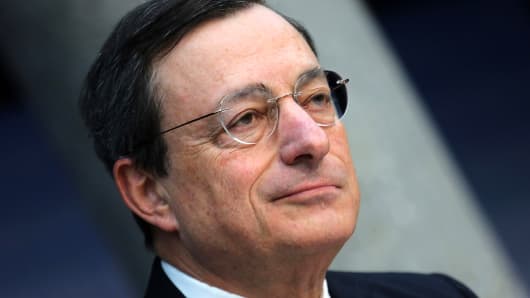The European Central Bank (ECB) will not resort to "higher inflation rates" to resolve the euro zone debt crisis and only "intervene" in the bond markets to ensure the solvency of a country, ECB President Mario Draghi told Germany's public broadcaster ZDF late Monday.
His comments come ahead of the first day of hearings in Germany's top court on the legality of the ECB's bond-buying program, which is widely credited with drawing a line under the region's debt crisis.
(Read More: Will Germany's Top Court Disarm ECB's 'Big Bazooka'?)
ECB members appear to have launched a charm offensive in German mainstream media to assuage the Germans' deeply rooted concerns about inflation and to gain public approval for the ECB's Outright Monetary Transactions (OMT) program that was launched in August last year.
Draghi told ZDF that the ECB would only intervene in the bond markets if there is a "confidence crisis in the euro which is threatening the solvency of a country, not beyond what their fundamentals are. But we won't intervene to ensure solvency if states are profligate."
The OMT has come under fire from critics such as the Bundesbank's Jens Weidmann, who is set to represent the German central bank at the court hearing this week. He has called the bond-buy program a direct financing of government budgets and says it compromises the ECB's independence and endangers the ECB's primary mandate of price stability.
"I can guarantee that we won't simply inflate our way out of debt. Part of the savings my family left us three children was destroyed by the inflation in Italy in the late 60s, early 70s. I have early memories about the damaging effects of inflation," Draghi told ZDF, addressing fears that high inflation would result from ECB's policies.
(Read More: Three Bullets for Draghi as ECB Set to Downgrade Growth)
A Plan B?
Asked whether there was a "Plan B" if the constitutional court deems the OMT program illegal, Draghi said: "I have full confidence in the constitutional court's independence and its ability to examine with thoroughness and fairness all the advice it is getting from all sides… It would be presumptuous of me to say what the conclusions could be."
The ECB will be represented at Tuesday's Germany court hearing by governing council member Joerg Asmussen.
Asmussen, in an interview with Germany's biggest daily "Bild" on Sunday, warned that a ruling against the OMT program would have "significant consequences" and that the "OMT was economically necessary, legally permissible, effective."
According to a recent note from Barclays, the main impact of the constitutional court ruling "will be on public opinion and political leanings ahead of elections."
A ruling by Germany's federal constitutional court is not expected before general elections in September.
(Read More: ECB Buying Out Staff Who Are Stuck in a Rut)
The ECB bond buying program is widely credited with helping bring calm to government bond markets in the peripheral euro zone states last year.
Mario Draghi last week described the OMT as "the probably most successful monetary policy measure undertaken in recent times."
It has enjoyed "broad support" with 22 out of 23 members of the ECB governing council voting for the program, Draghi told ZDF.



